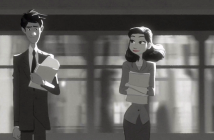
Editor’s Notes: Straight Outta Compton opens in wide theatrical release tomorrow, August 14th.
There is a title card that flickers on the screen toward the end of Boogie Nights that reads, “Long Way Down.” It’s so appropriate since it outright states the overwhelming feeling of the audience – after a heavenly rise, we witnessed a descent into hell. It also stands as a slogan for any similarly themed film audacious enough to chart the path from unfathomable success to shattering downfall. It’s a long way down from the top, and the most daunting part is that it’s hard to know where the bottom will be.
The film’s ultimate success lies in its larger-than-life audacity and its meditation on the most significant social message of this story: the unlikely rise out of suppression and poverty by speaking truth to power.
“Long way down” ran through my head as I watched Straight Outta Compton, which is an audacious, sprawling, wholly imperfect but entirely powerful epic that charts one such meteoric rise and fall, of the groundbreaking, game-changing pioneers of “Gangsta Rap,” N.W.A. There is plenty of ground to cover in the fact-based story of the controversial rap group that launched the careers of Dr. Dre, Ice Cube, and Eazy-E, and director F. Gary Gray’s film covers most of it, with varying levels of detail. There are some questionable omissions and questionable inclusions, but the film’s ultimate success lies in its larger-than-life audacity and its meditation on the most significant social message of this story: the unlikely rise out of suppression and poverty by speaking truth to power.

Such an impactful social message redefines our perspective on the traditional rise-and-fall trajectory of stories like this. Hubris and greed are inevitably the human frailties that lead powerful people down a path to disaster, and that holds true for the roller-coaster ride of successes and failures experienced by members of N.W.A., but theirs is not a simple rags-to-riches tale. There are thick layers of social subjugation and persistent injustice that make success less likely and more impressive. Does that excuse the resulting mess of resentment and betrayal, not to mention cycles of abuse of laws, drugs, and people? Absolutely not, but it should at least force us to ponder the unnecessarily toxic environment from which these superstars emerged. If one grows up unjustly oppressed, how can a sudden rise to fame and fortune not trigger a hastily immature reaction stemming from a natural instinct of self-preservation in the face of inequality?
The production and release of Straight Outta Compton in this moment could not be more relevant and can serve as a call to action.
The members of N.W.A. spoke out loudly and fiercely against that crippling inequality. They used the only tool at their disposal – their music – to speak out against the ugly realities of the world they lived in. As a result, they became the forerunners of a movement that we finally see proliferating the country. “Black Lives Matter” could have easily been the group’s motto, and beneath the swagger and the bravado and the rage of their controversial lyrics, that was the core message. Over 25 years since their first album dropped, that fight for equality carries on, in forms both peacefully organized and more reactionary and forceful. And it all stems from the source of N.W.A.’s impassioned art: the acknowledgement of institutional racism, the courage to expose it, and the will to fight back.
Of course, this is a film review and not a political action essay, isn’t it? From this particular critic’s perspective, however, one cannot be separated from the other, since the production and release of Straight Outta Compton in this moment could not be more relevant and can serve as a call to action.
Furious desire for progress is the fuel that drives this film and what helps elevate it above the standard order “music biopic,” even in the face of some glaring flaws that must be mentioned. This screenplay, by Jonathan Herman and Andrea Berloff, has a tendency to veer towards melodrama that at occasionally leaves these very talented young actors burdened with heavy-handed emotional soliloquies. Gray, always a solid filmmaker who is making an ambitious leap here, nevertheless tends to polish certain scenes beyond the point of believability; this film is at its most engaging when the style is rougher, more intimate. And perhaps the film’s most glaring flaw is the same charge that plagued N.W.A. for years – casual sexism. The film entirely neglects Dr. Dre’s history of violence against women, and there is one scene in particular, taking place at a hotel party, in which women are tossed around as equal parts sport and comedy while threatening people with assault weapons is treated as cutesy schtick. It’s a repugnant sequence that is completely out of touch with the rest of the film, which depicts dangerous behavior without glorifying it.
Straight Outta Compton does, quite frequently, glorify the artistic accomplishments of N.W.A., although I suppose that should be expected. The deification becomes redundant after a while, thought to be fair, love of these real-life characters is also what grounds this huge, expansive film. Its mere ambition is impressive on its own, but the script provides an enthralling behind-the-scenes look at the group’s tumultuous trajectory, and the performances sell every beat. O’Shea Jackson Jr., Ice Cube’s real-life son, is essentially channeling his father in an uncanny performance, Corey Hawkins impressively anchors the film as Dr. Dre, and Jason Mitchell exudes illuminating pathos as Eazy-E. That these still-young actors can carry a film this enormous (with some solid support from Paul Giamatii as the group’s manager, Jerry Heller) is impressive. They seamlessly embody these icons and provide a window into their plight. It’s certainly a long way down, but it’s a rewarding journey.
Straight Outta Compton is an audacious, sprawling, wholly imperfect but entirely powerful epic that charts one such meteoric rise and fall, of the groundbreaking, game-changing pioneers of “Gangsta Rap,” N.W.A.



